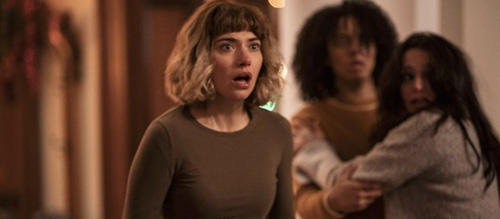Black Christmas (2019) Review
This article was written exclusively for The Film Magazine by The CineBlog’s Sophie Butcher.
Black Christmas (2019)
Director: Sophia Takal
Screenwriters: Sophia Takal, April Wolfe
Starring: Imogen Poots, Aleyse Shannon, Lily Donoghue, Caleb Eberhardt, Cary Elwes
The sorority slasher is back. We’re still in the Greek system, but with a decidedly feminist spin for this latest adaptation of Black Christmas directed by Sophie Takal and starring Imogen Poots.
Riley (Poots) and her MKE sisters are entering the Christmas break of their final year of college. Riley’s friend Kris (Aleyse Simpson) is a women’s rights warrior pushing petitions all over campus, and has managed to get a Bust of the founding father of Hawthorne College removed, as well as shake up the teaching staff when it comes to the all-male reading list.
Before the last of the students head home for the holidays, the girl gang go to a frat party to perform a festive number, bedecked in sexy Santa outfits. After stealing the show with a witty ditty exposing rape culture on campus, Riley and her friends begin to receive odd, aggressive messages apparently from the long-dead Hawthorne founder himself, and girls start going missing.
With no support from campus security – ‘9 times out of 10 in situations like this, the girl’s just with her boyfriend’ – the ladies are left to face the threat alone.
Much like the Charlie’s Angels remake released last month, Black Christmas wastes no time in asserting its political perspective; only a few scenes in, one of Riley’s sorority sisters bursts into her room, asking for a Diva cup and wearing a t-shirt that says ‘Your Manologuing Is Boring’. In its effort to explain the effects of the patriarchy at every turn, the film loses momentum, authenticity and interest, and starts to feel more like a lecture in Feminism 1.0 than a trip to the pictures.
Is it possible to do both? To tell woke, women-led stories without feeling like their righteous anger is being rammed down your throat? Based on the recent Hollywood output, they haven’t figured it out just yet.
Whilst the script is heavy-handed, the direction and cinematography provide much to enjoy. The use of lighting borders on sheer brilliance; Christmas bulbs bedeck the screen, casting a red and green glow across the faces of the actresses, and the huge sorority house lends itself to wonderful shots filled with multiple doorways – one to remember is a lingering master shot which sees doors opened one at a time, gradually lighting up the hallway before culminating in a great jump scare. The very first murder climaxes with the victim sprawled in the snow, arms waving up and down to attempt her escape; as she’s dragged from the frame, she leaves the imprint of a fallen snow angel behind.
Though originally written as an R rated picture, then pulled back to a PG-13 in an effort to introduce younger girls to horror, the violence is still fairly disturbing. The deaths come thick and fast, and are shown so bluntly that they still shock despite the age-rating’s demand for a lack of blood. At times, the brutality against women feels so incessant it begins to overwhelm – as though Black Christmas is feeding into the very thing it’s trying to take a stand against. There is relief in the opportunities for the women to fight back, but the eye-rolling nature of the script means those moments are distinctly unempowering.
Imogen Poots is the real standout in terms of performance. She has a quiet and delicate nature that speaks to the substantial strength that lies beneath, and is the only one given enough room to make the character her own. The rest of the cast are too suffocated by the laboured dialogue to do anything memorable; the girls are mostly a voicepiece for feminist cliches, and the men made into cartoon villains – though of course, that was the idea.
The change in rating is important; who the filmmakers were trying to speak to with Black Christmas is important. There’s a clumsiness to this movie that will turn off many, but its explicit approach to exploring a world where women get to fight the bad guys is an ideal introduction to the genre for a new generation of female film-lovers. This may not be one to revisit, but it will surely find a place as a modern sleepover staple.
12/24


